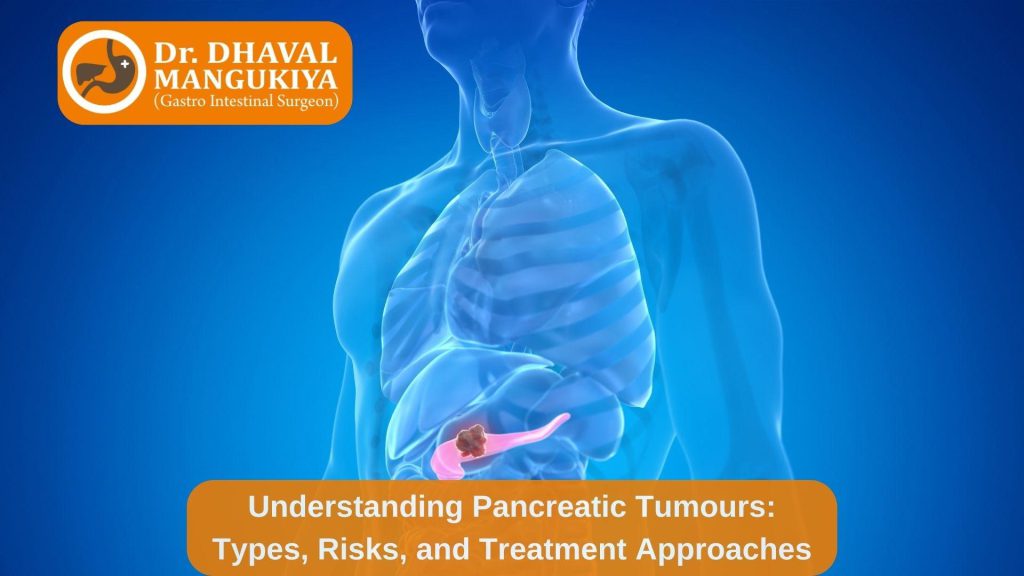Pancreatic tumours are a complex and often challenging medical condition that affects thousands of individuals each year. These tumours can vary in type, present significant risks, and require careful consideration when determining the most effective treatment approach. In this blog, Dr Dhaval Mangukiya, one of the best laparoscopic surgeons, delves into the different types of pancreatic tumours, the associated risks, and the various treatment options available to patients.
Types of Pancreatic Tumours
Pancreatic tumours vary in terms of their symptoms and prognosis. Some of them are:
Pancreatic Adenocarcinoma
The best pancreatic surgeons in Surat, including Dr Dhaval Mangukiya, say that this type of tumour is the most common form of pancreatic cancer and accounts for the majority of cases. Pancreatic adenocarcinoma typically originates in the cells lining the pancreatic ducts and is known for its aggressive nature and tendency to metastasize.
Pancreatic Neuroendocrine Tumours (PNETs)
PNETs are less common than pancreatic adenocarcinoma but can still pose significant health risks. These tumours develop from hormone-producing cells in the pancreas called neuroendocrine cells. PNETs can be either functional, meaning they produce hormones, or non-functional, meaning they do not produce hormones.
Cystic Tumours
Cystic tumours of the pancreas are fluid-filled growths that can be benign or malignant. These tumours often present as cystic lesions on imaging studies and may require further evaluation to determine their nature and appropriate management.
Risks Associated with Pancreatic Tumours
1. Age: Advanced age is a significant risk factor for developing pancreatic tumours, with the majority of cases diagnosed in individuals over the age of 65.
2. Smoking: Cigarette smoking is strongly associated with an increased risk of pancreatic cancer. Smokers are at a higher risk of developing pancreatic tumours compared to non-smokers.
3. Family History: As per the experience of Dr Dhaval Mangukiya, one of the best pancreatic surgeons in Surat, individuals with a family history of pancreatic cancer or certain genetic syndromes, such as hereditary pancreatitis or Lynch syndrome, have an elevated risk of developing pancreatic tumours.
4. Chronic Pancreatitis: Chronic inflammation of the pancreas, known as chronic pancreatitis, is a risk factor for the development of pancreatic cancer over time.
5. Obesity and Diet: Obesity, a diet high in red and processed meats, and low fruit and vegetable intake are linked to an increased risk of pancreatic tumours.
Treatment Approaches for Pancreatic Tumours
Surgery
Surgical resection is often considered the primary treatment for operable pancreatic tumours. Depending on the location and stage of the tumour, procedures such as Whipple surgery (pancreaticoduodenectomy), distal pancreatectomy, or total pancreatectomy may be performed to remove the tumour and affected pancreatic tissue, says Dr. Dhaval Mangukiya, one of the best laparoscopic surgeon in Surat.
Chemotherapy
Chemotherapy may be used as neoadjuvant therapy before surgery to shrink the tumour or as adjuvant therapy after surgery to reduce the risk of recurrence. Chemotherapy regimens commonly used for pancreatic cancer include gemcitabine, nab-paclitaxel, FOLFIRINOX, and 5-fluorouracil (5-FU) based combinations.
Radiation Therapy
Radiation therapy may be utilized alone or in combination with chemotherapy to treat pancreatic tumours. This treatment modality uses high-energy beams to target and destroy cancer cells while minimizing damage to surrounding healthy tissue.
Targeted Therapy
Targeted therapy drugs are designed to specifically target cancer cells based on their molecular characteristics. Examples of targeted therapies used for pancreatic cancer include erlotinib, cetuximab, and bevacizumab.
Immunotherapy
Immunotherapy drugs work by stimulating the body’s immune system to recognize and attack cancer cells. While immunotherapy has shown promise in other types of cancer, its efficacy in pancreatic cancer is still being studied in clinical trials.
Palliative Care
For advanced pancreatic cancer that cannot be cured, palliative care focuses on relieving symptoms, improving quality of life, and providing emotional support for patients and their families.
Final Thoughts
Pancreatic tumours encompass a diverse range of malignancies with varying types, risks, and treatment approaches. Early detection and prompt intervention are crucial for improving outcomes and enhancing the quality of life for individuals diagnosed with pancreatic tumours. The best gastrointestinal surgeons in Surat have shared the symptoms and treatment options to create awareness about the types of pancreatic tumours, recognizing associated risk factors, and exploring available treatment options. Patients and healthcare providers can work together to develop personalized treatment plans tailored to individual needs and circumstances.

